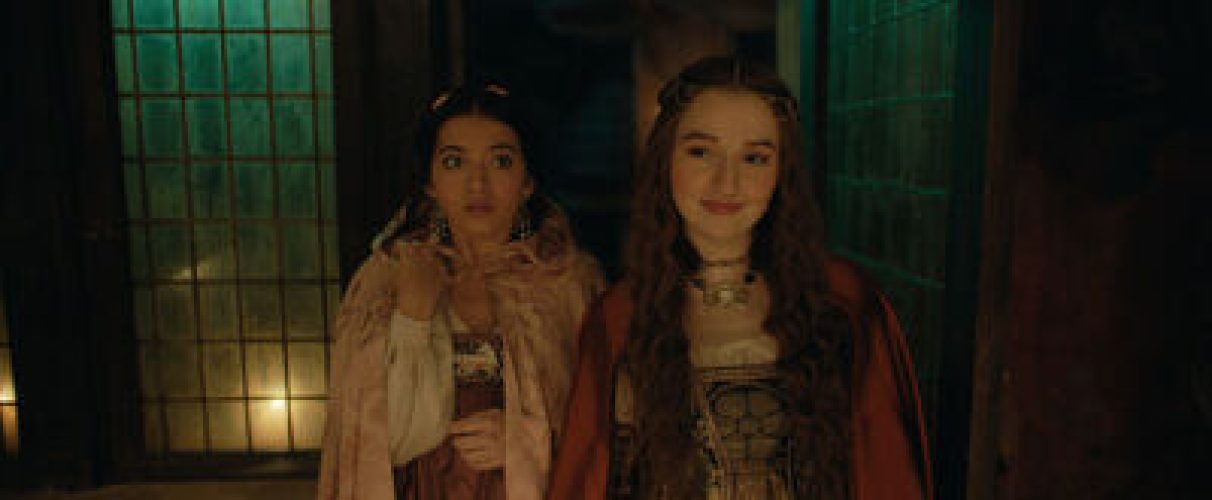Whenever art becomes classic, it’s bound to spawn reinventions. Karen Maine’s “Rosaline,” a quippy and sarcastic remix of William Shakespeare’s Romeo and Juliet, is the latest addition. Based on the book When You Were Mine by Rebecca Serle, it pulls back the curtain on Romeo’s titular former lover and consequential cousin of the fated Juliet. The film follows the tribulations of Rosaline (Kaitlyn Dever) as she is proffered by her father to eligible bachelors and cast aside by her secret lover, Romeo (Kyle Allen), only to discover her replacement is in her own family tree.
The comedy in “Rosaline” is largely due how it thrusts Shakespeare’s dialogue into modernity. However, the absurdity of corseted women, living in an era where they are meant to be seen and not heard, uttering “blow me” to suitors is not a sustainable form of comedy. It gets old quickly when it’s the only laughable effort inserted into the script. There are certainly chuckle-worthy moments in the film, but they’re counted with a single hand.
The anachronistic details of the film exist in every nook and cranny. Its dialogue is modern, the score and soundtrack contain renditions of contemporary songs, and the accents of the characters in Verona range from Southern United States to British. This flippant tossing of contrasting anachronisms throughout every aspect of the film toes the line of intentional comedy and neglectful detailing. However, it cuts right through all the formalities of traditional Shakespeare that might not appeal to certain audiences, so it has that going for it.
Maine’s film pokes fun at such romance tropes while playing into them; contrasting the love stories of Rosaline and Juliet (played here by Isabela Merced) allows the film to dissect their juxtaposed romanticism. Rosaline’s love affair with Romeo was more hesitant and thoughtful, while Juliet’s was a complete swan dive into infatuation. The act of romanticizing love to the point of genuine emotional blindness is examined through both characters. “Rosaline” also considers the way women are expected to sacrifice identity on behalf of the men in their lives, fathers, and lovers specifically. However, there are plenty of shallow female empowerment lines and girl power moments that feel like pandering to the expectations of a modern adaptation of this story.
“Rosaline” is also unremarkable visually, with camera movements and color grading that are most reminiscent of a high-budget insurance commercial. The acting falls equally short: Dever has her moments throughout the third act, but she spends the majority of the film cycling through the same eye rolls and dry delivery. The side characters don’t offer much more, except for Dario (Sean Teale), the will-they-won’t-they Italian bachelor, who performs with more emotion than the line readings occurring around him. There’s leeway to be given regarding romantic chemistry in a film as ham-fisted and blasé as “Rosaline,” but there’s not a single moment of believable connection among any of the pairings in the film.
It’s necessary to understand that “Rosaline” is not trying to exchange blows with the detail of an Austen adaptation like “Emma.,” which is similarly comedic but stylistically more refined and considerate. “Rosaline”‘s goal is to be a nonchalant, jaunty comedy inspired by a classic story. But with its forced script and unsuccessful performances, “Rosaline” falls short, even in its intended genre sphere. It allows itself to have fun, but it doesn’t accomplish much else.
On Hulu today.
Whenever art becomes classic, it’s bound to spawn reinventions. Karen Maine’s “Rosaline,” a quippy and sarcastic remix of William Shakespeare’s Romeo and Juliet, is the latest addition. Based on the book When You Were Mine by Rebecca Serle, it pulls back the curtain on Romeo’s titular former lover and consequential cousin of the fated Juliet. The film follows the tribulations of Rosaline (Kaitlyn Dever) as she is proffered by her father to eligible bachelors and cast aside by her secret lover, Romeo (Kyle Allen), only to discover her replacement is in her own family tree. The comedy in “Rosaline” is largely due how it thrusts Shakespeare’s dialogue into modernity. However, the absurdity of corseted women, living in an era where they are meant to be seen and not heard, uttering “blow me” to suitors is not a sustainable form of comedy. It gets old quickly when it’s the only laughable effort inserted into the script. There are certainly chuckle-worthy moments in the film, but they’re counted with a single hand. The anachronistic details of the film exist in every nook and cranny. Its dialogue is modern, the score and soundtrack contain renditions of contemporary songs, and the accents of the characters in Verona range from Southern United States to British. This flippant tossing of contrasting anachronisms throughout every aspect of the film toes the line of intentional comedy and neglectful detailing. However, it cuts right through all the formalities of traditional Shakespeare that might not appeal to certain audiences, so it has that going for it. Maine’s film pokes fun at such romance tropes while playing into them; contrasting the love stories of Rosaline and Juliet (played here by Isabela Merced) allows the film to dissect their juxtaposed romanticism. Rosaline’s love affair with Romeo was more hesitant and thoughtful, while Juliet’s was a complete swan dive into infatuation. The act of romanticizing love to the point of genuine emotional blindness is examined through both characters. “Rosaline” also considers the way women are expected to sacrifice identity on behalf of the men in their lives, fathers, and lovers specifically. However, there are plenty of shallow female empowerment lines and girl power moments that feel like pandering to the expectations of a modern adaptation of this story. “Rosaline” is also unremarkable visually, with camera movements and color grading that are most reminiscent of a high-budget insurance commercial. The acting falls equally short: Dever has her moments throughout the third act, but she spends the majority of the film cycling through the same eye rolls and dry delivery. The side characters don’t offer much more, except for Dario (Sean Teale), the will-they-won’t-they Italian bachelor, who performs with more emotion than the line readings occurring around him. There’s leeway to be given regarding romantic chemistry in a film as ham-fisted and blasé as “Rosaline,” but there’s not a single moment of believable connection among any of the pairings in the film. It’s necessary to understand that “Rosaline” is not trying to exchange blows with the detail of an Austen adaptation like “Emma.,” which is similarly comedic but stylistically more refined and considerate. “Rosaline”‘s goal is to be a nonchalant, jaunty comedy inspired by a classic story. But with its forced script and unsuccessful performances, “Rosaline” falls short, even in its intended genre sphere. It allows itself to have fun, but it doesn’t accomplish much else. On Hulu today. Read More


